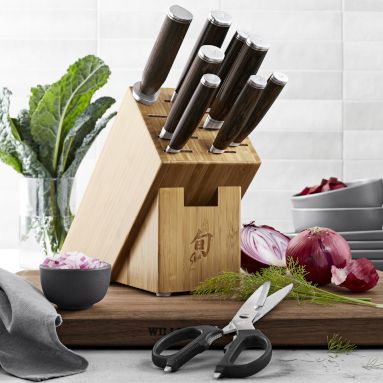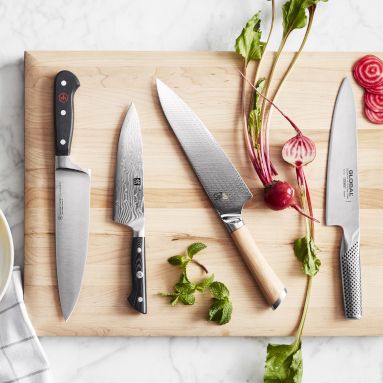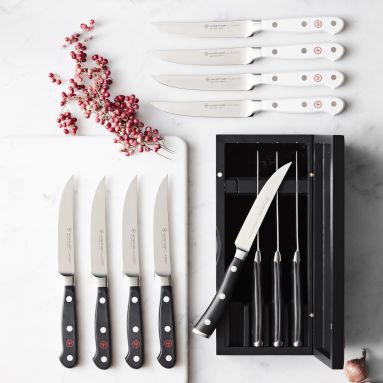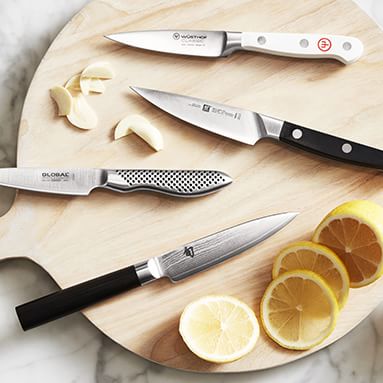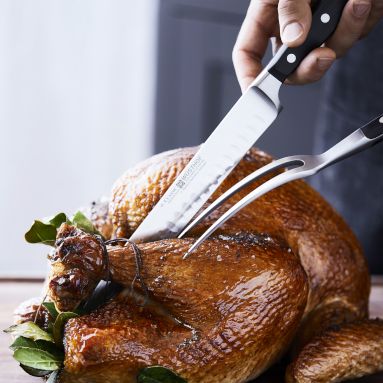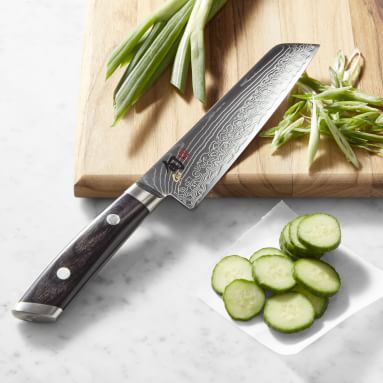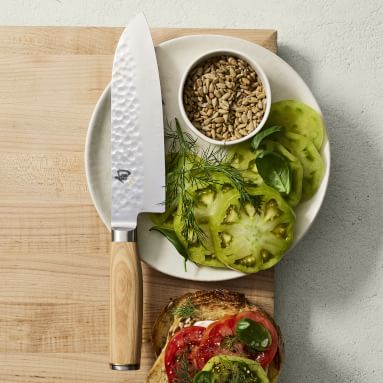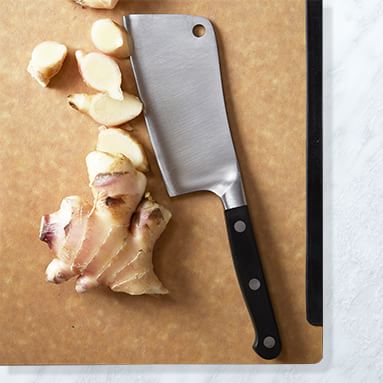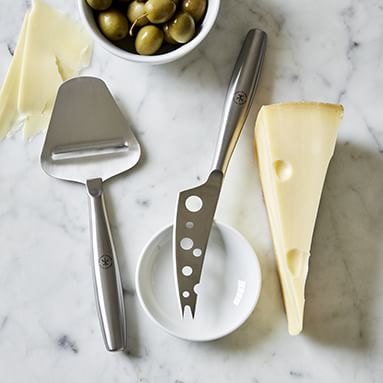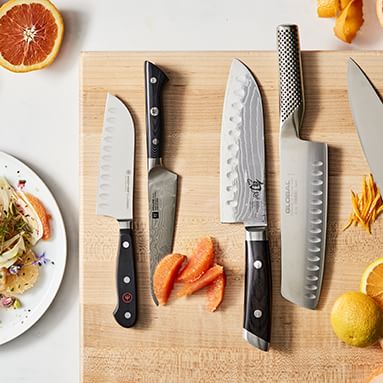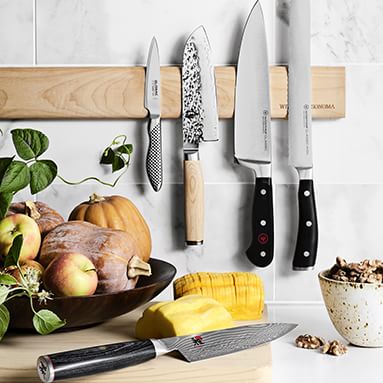Why You Need A Top Notch Bread Knife
Discover the joys of slicing your own bread at home when you treat yourself to a high-quality bread knife. Use yours to slice into whole, freshly-baked loaves, to create chunks of baguettes for dipping or toppings, or to cleanly cut sandwiches in half. A serrated bread knife is one of the essentials in a well-stocked kitchen. Shop for one that's finely made and comfortable for you to use. The choice you make can last you years of enjoyment.
What Makes A Bread Knife Unique?
The main difference between a bread knife and a utility or chef's knife of a similar size is serration.
- Serrated blades have tiny points or ridges that act as teeth along the length of the blade's sharp side.
- These serrations hook into foods, especially softer ones like bread, and let you cut with less friction than a straight-edge blade. The lower friction makes it easier to get a clean cut on a softer food item.
- While most serrations are sharp points, others are scalloped, either lightly or more fully to allow more surface contact between the knife and the bread.
Choosing Your Knife Features
Select the style of serrated knife that suits how you think you'll use it most
Carving Knives & Slicers
Whether you’re carving up a Thanksgiving turkey in front of your guests or working behind the scenes in the kitchen to create translucent radish-slice rose petals, these knives are your ideal tools for cutting and slicing rather than chopping and cleaving. Peruse a variety of different knife types and some helpful accessories to make carving and slicing easier than ever.
Carving & Slicing Knife Characteristics
As with a boning knife and other specialty knife types, a slicing or carving knife has a particular shape and size that’s designed to facilitate a specific type of cut. When compared to a chef’s knife, for example, you can see that a slicing or carving knife is uniformly very thin, while a chef’s knife is more triangular in shape, tapering to its blade from a thicker top. A well-honed and sharpened chef’s knife can certainly carve a turkey or slice sushi-grade tuna, but its cuts won’t be as precise, and it might create some mess in the process. Slicing and carving knives are thin, straight and long, generally without dramatic curves. This helps the knife cut through large foods and allows the user to enjoy precise accuracy. Carving and slicing knives may also have hollow edges on their blades to help prevent slices from sticking to the knife, a feature that’s especially helpful when cutting moist foods.
Slicing vs. Carving Knife
Though they serve the same general purpose, there are some differences between slicing and carving knives. Slicing knives are usually shorter and smaller because they aren’t designed to power through large roasts or whole turkeys. This is also why carving knives tend to be a bit bulkier and sturdier. Slicers are designed more for precision, while carvers are designed more for strength and durability. This is why most ceramic knives are considered slicing knives. Ceramic is even sharper than steel, so it makes sense that a knife you’d use to cut paper-thin sashimi slices would be built both sharper and smaller for easier control.
Helpful Carving and Slicing Accessories
In addition to knives there are a variety of handy accessories that can making slicing and carving food much easier. You can buy a carving knife and fork pair to make carving hot foods much easier; the fork stabilizes while the knife cuts. At Williams Sonoma, we also offer a selection of cutting boards to facilitate better slicing or carving and easier cleanup. Even on a butcher block island or another counter surface that’s suitable for food prep, it’s usually a good idea to use a cutting board when carving cooked meats or slicing raw meat. Cutting board cleanup is much simpler when you can take the whole cutting board to the sink.
Regardless of which specific foods you plan to slice or carve, these knives serve a distinct purpose that sets them apart from all others. Remember too that electric deli slicers can be a great solution for the versatile home kitchen. No matter how sharp and precise the knife, human error can be a factor in getting perfectly even, paper-thin slices of meats, fruits and vegetables. One solution is to hone your knife skills, but if you’d rather spend your time eating, an electric slicer can be the ideal companion. With so many great options to consider, there’s no doubt you’ll find the solution to your slicing and carving needs.
often. If you know you have a number of uses for it, you can invest in a more traditional or classic style and then choose another one to match a statement-piece cutting board or other use.- Double serrated knives offer an even cleaner cut. Use these knives to make gorgeous, uniform slices of cornbread or other baked loaves.
- Choose a knife with a recessed bolster in the middle to make sharpening easier. You can use a manual sharpener if there's a part of the blade that requires more care to reach with a lower set bolster.
- If you like a heavier feel to your knife or prefer a heavier handle to balance the blade, look for a bolster at the butt of the handle.
Other Uses for A Serrated Bread Knife
Your serrated knife can be used for more than just bread. Rely on this knife to handle a variety of kitchen tasks.
- Cut anything with a waxy skin, like citrus or peppers. These food items can be cut with straight-edge blades, too, but the serrations help create an easier hook, especially in peppers which can show a tendency to crush under the pressure of the first cut.
- Pineapples are quicker to cut with a serrated knife. The sawing motion a bread knife supports is a great way to get through the solid cores and thick flesh while retaining a lot of the juice.
- Tomatoes, like peppers, sometimes roll or crush when cut, unless you use the right knife. Let serrated teeth handle the watery flesh. You can use paring knives to remove their cores.
- Layer cakes maintain their integrity when you use serrations to get through different textures.
Enjoy the multiple ways this kitchen essential makes some of your favorite foods easier to prep and serve.

